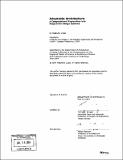| dc.contributor.advisor | Terry W. Knight. | en_US |
| dc.contributor.author | Zulas, Alejandro, 1976- | en_US |
| dc.contributor.other | Massachusetts Institute of Technology. Dept. of Architecture. | en_US |
| dc.date.accessioned | 2005-09-06T21:23:58Z | |
| dc.date.available | 2005-09-06T21:23:58Z | |
| dc.date.copyright | 2004 | en_US |
| dc.date.issued | 2004 | en_US |
| dc.identifier.uri | http://hdl.handle.net/1721.1/27033 | |
| dc.description | Thesis (S.M.)--Massachusetts Institute of Technology, Dept. of Architecture, 2004. | en_US |
| dc.description | Includes bibliographical references (p. 61-62). | en_US |
| dc.description.abstract | Based on the fact that architecture is, among other things, the crystallization of a mediation among design intentions (function), meaning and contextual constraints (performance), we as designers are obligated to produce morphologically flexible & adaptive design solutions; both during the design process and as a final outcome. In that sense this thesis is an open ended exploration of embedding rational adaptability to object design through computational tools. This thesis will speculate on the advantages of thinking architecture in terms of "adaptation" in an action-reaction fashion, evolving from the seed idea of "motion" in architecture but rather pushing and exploring the potential of digitally designed responsive buildings and the dissection of its methodological approach. Empirically, it will look into some of nature's responsive designs, arguing that buildings can be conceptualized as adaptable living organisms. It will also analyze the role of computational tools and programming languages as meaningful mediums that help designers to better understand, set-up, define and re-define design problems. It will argue that more than an automated provider of an endless number of design solution computers can work as a systematic tool, making us more conscious during the design process. | en_US |
| dc.description.statementofresponsibility | by Alejandro Zulas. | en_US |
| dc.format.extent | 62 p. | en_US |
| dc.format.extent | 3578396 bytes | |
| dc.format.extent | 3584206 bytes | |
| dc.format.mimetype | application/pdf | |
| dc.format.mimetype | application/pdf | |
| dc.language.iso | en_US | |
| dc.publisher | Massachusetts Institute of Technology | en_US |
| dc.relation.requires | Computer optical disk contains thesis in .pdf format and files in Java code, Rhinoscript and CATIA files. | en_US |
| dc.rights | M.I.T. theses are protected by copyright. They may be viewed from this source for any purpose, but reproduction or distribution in any format is prohibited without written permission. See provided URL for inquiries about permission. | en_US |
| dc.rights.uri | http://dspace.mit.edu/handle/1721.1/7582 | |
| dc.subject | Architecture. | en_US |
| dc.title | Adaptable architecture : a computational exploration into responsive design systems | en_US |
| dc.type | Thesis | en_US |
| dc.description.degree | S.M. | en_US |
| dc.contributor.department | Massachusetts Institute of Technology. Department of Architecture | |
| dc.identifier.oclc | 56781426 | en_US |
